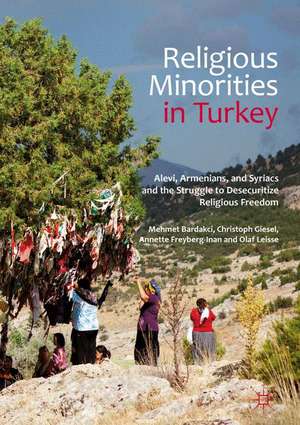Religious Minorities in Turkey: Alevi, Armenians, and Syriacs and the Struggle to Desecuritize Religious Freedom
Autor Mehmet Bardakci, Annette Freyberg-Inan, Christoph Giesel, Olaf Leisseen Limba Engleză Hardback – 10 feb 2017
Preț: 529.60 lei
Preț vechi: 623.06 lei
-15% Nou
Puncte Express: 794
Preț estimativ în valută:
101.34€ • 106.07$ • 84.35£
101.34€ • 106.07$ • 84.35£
Carte tipărită la comandă
Livrare economică 31 martie-14 aprilie
Preluare comenzi: 021 569.72.76
Specificații
ISBN-13: 9781137270252
ISBN-10: 113727025X
Pagini: 294
Ilustrații: XVI, 275 p. 35 illus.
Dimensiuni: 148 x 210 x 21 mm
Greutate: 0.48 kg
Ediția:1st ed. 2017
Editura: Palgrave Macmillan UK
Colecția Palgrave Macmillan
Locul publicării:London, United Kingdom
ISBN-10: 113727025X
Pagini: 294
Ilustrații: XVI, 275 p. 35 illus.
Dimensiuni: 148 x 210 x 21 mm
Greutate: 0.48 kg
Ediția:1st ed. 2017
Editura: Palgrave Macmillan UK
Colecția Palgrave Macmillan
Locul publicării:London, United Kingdom
Cuprins
Preface and Acknowledgements.- 1. Introduction.- 2. European Integration and Minority Rights.- 3. Securitization and De-securitization.- 4. The Alevi.- 5. The Armenians.- 6. The Syriacs.- 7. Minority Groups in Comparison.- Conclusions.- Appendix: Survey and Interview questions and Lists of Interviews with Minority Organizations and Experts.- Bibliography.- Index.
Notă biografică
Mehmet Bardakçı is Assistant Professor in Political Science and International Relations at Yeni Yüzyıl University, Istanbul, Turkey. He obtained a BA in International Relations from Bilkent University in 1994 and a PhD in Political Science from Duisburg-Essen University in 2007. His work spans Turkish politics and foreign policy, Euroscepticism, Europeanization, democratization, minority rights, and civil-military relations.
Annette Freyberg-Inan is Lecturer in International and European Politics at the University of Amsterdam, the Netherlands, and affiliated with the Amsterdam Institute for Social Science Research. She has published widely in her fields, chairs the Theory Section of the International Studies Association, and just completed a term as co-editor of the Journal of International Relations and Development.
Christoph Giesel is Post-Doctoral Researcher and Lecturer atthe Institute of Slavistics and Caucasus Studies at the Jena University, Germany. His main research interests are in manifestations of nationalism, ethnicity, religion and minorities and in structures and dynamics of political and social organization with a special focus on the Balkans, Anatolia, Caucasus, Middle East and North Africa.
Olaf Leisse is Professor of European Studies at Friedrich Schiller University Jena, Germany. He has published widely about South East Europe and Turkey. His special interest is in Europeanization processes in EU Accession States, as well as the current disintegration process.
Annette Freyberg-Inan is Lecturer in International and European Politics at the University of Amsterdam, the Netherlands, and affiliated with the Amsterdam Institute for Social Science Research. She has published widely in her fields, chairs the Theory Section of the International Studies Association, and just completed a term as co-editor of the Journal of International Relations and Development.
Christoph Giesel is Post-Doctoral Researcher and Lecturer atthe Institute of Slavistics and Caucasus Studies at the Jena University, Germany. His main research interests are in manifestations of nationalism, ethnicity, religion and minorities and in structures and dynamics of political and social organization with a special focus on the Balkans, Anatolia, Caucasus, Middle East and North Africa.
Olaf Leisse is Professor of European Studies at Friedrich Schiller University Jena, Germany. He has published widely about South East Europe and Turkey. His special interest is in Europeanization processes in EU Accession States, as well as the current disintegration process.
Textul de pe ultima copertă
This book considers the key issue of Turkey’s treatment of minorities in relation to its complex paths of both European integration and domestic and international reorientation. The expectations of Turkey’s EU and other international counterparts, as well as important domestic demands, have pushed Turkey to broaden the rights of religious and other minorities. More recently a turn towards autocratic government is rolling back some earlier achievements. This book shows how broader processes affect the lives of three important religious groups in Turkey: the Alevi as a large Muslim community and the non-Muslim communities of Armenians and Assyrians. Drawing on a wealth of original data and extensive fieldwork, the authors compare and explain improvements, set-backs, and lingering concerns for Turkey’s religious minorities and identify important challenges for Turkey’s future democratic development and European path. The book will appeal to students and scholars in the fields of minority politics, contemporary Turkish politics, and religion and politics.
Caracteristici
Evaluates the reforms and progress made with respect to the rights of minorities in Turkey by applying securitization theory Focuses on the religious minorities of the Alevi, Armenians and Assyrians in the contemporary political context of European integration and AKP government Draws on thorough empirical research using in-depth interviews and questionnaires collected across Turkey including Mardin, Istanbul and Ankara

















